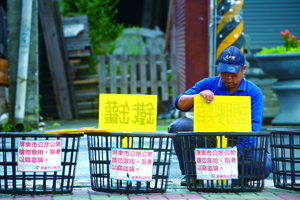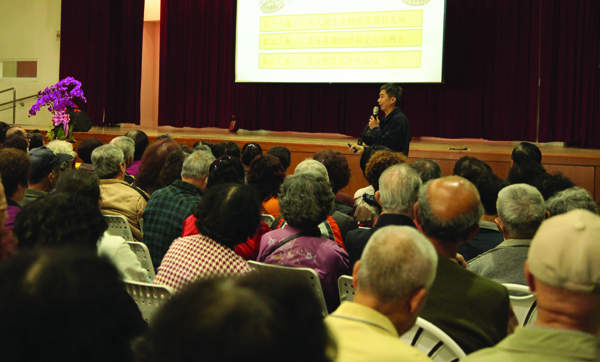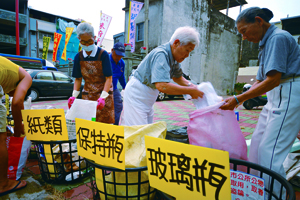

| A New Recycling Experience | ||||||||||
| By Ye Zi-hao Translated by Tang Yau-yang Photos by Yan Lin-zhao | ||||||||||
Pingdong, a city of 200,000, is located in the far south of Taiwan. The city government has implemented a new model for handling its recyclables. Now on a designated day and time each week, residents take their recyclables to one of about a hundred locations throughout the city. There, Tzu Chi volunteers and private recyclers take over.
One Tuesday evening, a loudspeaker in the Dazhou neighborhood of Pingdong blared out a public message: “Our city and Tzu Chi have joined together in doing recycling. From seven to eight tonight, take your recyclables to the square diagonally opposite Chaofeng Temple.” Before seven that evening, Tzu Chi volunteers were already at the square guiding residents to deposit their recyclables into the proper collection baskets. If volunteers found that someone had mixed garbage in with the recyclables, they advised him not to do so. They also reminded people of the need to clean their recyclables by rinsing off containers of sugary liquids or greasy food before bringing them to the collection point. About an hour later, a Tzu Chi volunteer drove a city truck to the site, picked up the recyclables, and delivered them to a nearby Tzu Chi recycling station. Other volunteers cleaned up the collection point and restored it to what it was before. This scenario repeats itself every week at this square, as well as at more than a hundred other sites throughout the city. This joint program, the first public and private collaboration of its kind in Taiwan, has been in operation since March 17, 2014.
The heritage program Before the new program came into effect, city recycling trucks used to tag along behind garbage trucks as they made their rounds through the neighborhoods. Back then, the city contracted out the recycling part of the pickup service. The pickup trucks were provided by the city; the contractor was responsible for the operating costs, such as truck drivers, other workers, and gasoline. Part of the proceeds from the sale of collected recyclables went to the city, and the contractor kept the remainder. This arrangement worked until recently, when the prices of recyclables plunged and more individuals collected recyclables to sell for themselves. The profits of the city contractor were severely diminished. The contractor’s income was further reduced by the large amounts of actual garbage that city residents threw in along with their recyclables. After collection trips, city employees examined the stuff residents had brought and found that garbage made up as much as 30 percent of what was being picked up by the recyclers. Garbage fetches no money, and it takes a lot of time to clean up when it contaminates otherwise good recyclables. Eventually, the contractor’s profit margin decreased so much that he was willing to pay a penalty to terminate the contract with the city. The city did not have the resources to take over the recyclables collection. In the end, city officials were able to sweet-talk the contractor into honoring the terms of the contract, although he would not renew it after it expired. The city started calling for bids from prospective new contractors in October 2013, but the initial bid process failed to produce a new contractor. The city tried three more times to secure a bid for the job, but all without success. To attract bidders, the city later waived its share of sale proceeds, leaving all the money to the successful bidder. Still there were no takers. City officials were now really worried. They began to consider the worst-case scenario, that the city’s sanitation staff would have to take over the responsibility. But that would not have been a happy solution. To handle recyclables in-house, the city would have had to increase their budget US$330,000 per year for personnel, fuel, and vehicle maintenance. The total revenue from the sale of recyclables in 2013 was only US$60,000. It would have cost Pingdong citizens US$270,000 a year if the city itself had taken over the job of handling the recyclables. Submitting a budget request for such a large sum was not very appealing to government officials. They were eager to find a better solution.
A new idea In the midst of their brainstorming for a way forward, one government official threw out a question: “Why not try Tzu Chi?” Although the foundation had never done anything like that with the city before, it had been actively involved with recycling for more than two decades. City officials saw a glimmer of hope. Tzu Chi was open to the idea, but there were details to be ironed out. In late December 2013 the two sides started negotiations on the matter. Initially, city officials suggested maintaining the current model for picking up and processing the recyclables, the only difference being that Tzu Chi would step in to take the place of the contractor. In other words, volunteers would drive recycling trucks behind city garbage trucks. Then they would deliver the collected recyclables to Tzu Chi recycling stations for further processing and sale. The proceeds would go to the foundation to support its charity work. However, Tzu Chi volunteers pointed out that such an arrangement would probably not address the knotty old issue of collecting a lot of garbage mixed in with the recyclables. They believed that this problem could only be solved if the environmental awareness of the city residents could be raised. Volunteer Huang Li-xiang (黃麗香) implored city officials to lead citizens in a grassroots effort to recycle. Only through widespread civic involvement could their joint efforts, limited in manpower and other resources, be expected to bear fruit throughout the city. Their discussions gradually converged toward a new idea: Residents would be instructed to take recyclables to a fixed central location in their community between seven and eight o’clock on a fixed evening of the week for collection. The new proposal contrasted sharply with the old way in many points. Instead of several days a week, city residents would take out their recyclables just one day a week. Before, residents used to take recyclables to a curbside in their immediate neighborhood for truck pickup, but now they would have to take their recyclables to a central collection point in their community, generally a longer trip for most people. Instead of putting all their recyclables in one big bag, residents would be expected to sort their recyclables and put them into appropriate baskets at the collection point in their community. Instead of following garbage trucks on their routes, recycling trucks would pick up at central collection points only. Most importantly, only clean recyclables would be welcome. City officials and Tzu Chi volunteers decided the roles that each organization would play in this program: Officials would work with neighborhood administrators to ensure that suitable collection sites were available, and they lined up enough collection baskets to accept deposits from residents. Tzu Chi volunteers, on the other hand, would show residents how to properly sort their recyclables at the collection points, transport recyclables to nearby Tzu Chi recycling stations, and clean up the venues afterwards.
Preparations The proposal appeared very feasible, but in the face of this unprecedented collaboration, city officials and Tzu Chi volunteers wanted to make sure that all bases were covered. Volunteers sought approval from Master Cheng Yen, who encouraged them to go for it. Since the proposal would require grassroots involvement of many people in Pingdong, it would be right in line with the Tzu Chi ideal of getting everyone and every family to recycle. But she reminded the volunteers to steer clear of politics and elections. She also told them that detractors would most likely appear. She added the wise advice that if the volunteers were certain that the program was the right thing to do, they should not let different opinions distract them from their efforts. City officials, for their part, consulted legal authorities on the propriety of such a public-private collaboration. “The expert legal opinion we obtained was that since Tzu Chi would need to put in more than it would get out of this collaboration,” said Pingdong Mayor Yeh Shou-shan (葉壽山), “there would be no risk of cronyism or illicit kickbacks.” Once the proposal had been cleared on both sides to proceed, the teams got to work. The city printed 70,000 flyers and distributed them to city households to announce the new program. Then, in mid-March 2014, about a thousand neighborhood administrators gathered at the city hall for a workshop. Tzu Chi volunteers explained to them why recycling was necessary, why it was important to collect only clean recyclables, and how to conduct the fixed-point, fixed-time recycling campaign. To raise awareness and to prepare constituents for the project, volunteers conducted four information sessions for city residents and four more for foundation volunteers who might be involved with the campaign. Volunteer Guo Yi-zhang (郭宜彰) was in charge of the awareness sessions. He pointed out that citizens would be doing at least three good things by taking part in this program.
The first good thing occurs when a person puts an item into a collection basket. This simple act embodies love for Mother Earth. Secondly, when a person removes filth or dirty contents from a recyclable item before taking it to the collection point, the person is doing another good thing, because he or she spares the Tzu Chi volunteers who process the recyclables the foul smells and insects that such contents often exude or attract. Thirdly, the proceeds from the sale of recyclables go to help the foundation do good. Donors can take comfort in knowing that they’re contributing to a good cause, simply by recycling.
Implementation The city sanitation team divided the city into four zones with about a hundred collection points. The joint recycling program takes place in the north, south, west, and east zones on Mondays, Tuesdays, Wednesdays, and Fridays, respectively. On those nights between seven and eight o’clock, city residents may take their recyclables to the nearest collection point for disposal. Tzu Chi volunteers work at 85 percent of the collection points, and private individuals handle the rest. This is done so as not to deprive individual scavengers of their livelihoods. A dozen or so large city-supplied baskets are placed at each collection point just before the event opens for the night. Each basket is clearly labeled to receive a specific category of recyclables, such as paper, plastic, or metal. It is fairly straightforward for people to deposit their things into the proper baskets, but volunteer workers are on hand to help any one who is uncertain about or unfamiliar with the process. If a resident brings in recyclables mixed with rubbish, volunteers will point that out and advise the person to bring only clean recyclables to the venue. Residents have been receptive to this kind of on-the-spot education, and they mindfully do their part to help protect the Earth.
Participating volunteers With regard to volunteer involvement, since the program started it has logged a weekly average of 460 person-times, or nearly 2,000 person-times a month. That’s the number of times volunteers have served for the project. Most of the participating volunteers work at collection points, where they help people with proper sorting, keep an eye on things so that garbage does not slip through, and sort through collected items so they become easier to handle after they are delivered to a recycling station. Some volunteers drive city recycling trucks to pick up items at collection points and transport them to Tzu Chi recycling stations. Drivers start to work at eight o’clock, when the collection points close, and it is usually after nine by the time they finish. Volunteer Yang Zhi-cheng (楊志成) is a cooking oil wholesaler. Out of his own pocket, he paid his three company drivers to drive recycling trucks. Despite having to work so late, the drivers agreed to take part in this program. After they had witnessed how Tzu Chi volunteers gave of themselves, they even refused the extra pay. They have been serving for free ever since. Xie Lin Jin-zhi (謝林金枝), 90, walked slowly from her home to the collection point across from Daitian Temple. “I work here from seven to eight every Wednesday,” she said. “It’s good for my health and good for the earth.” Wang Jiu (王就), 82, and Wu Cai-mei (吳彩眉), 77, also worked there that night. They may be a bit slow because of their age, but their mindfulness is unrivaled. They usually volunteer at the local recycling station, so working at the collection point is not really extra work for them.
After trucks haul away the day’s collection, volunteers clean up the sites before leaving for the night. When people walk past these sites in the morning, they see no signs of the recycling activities the night before. It has been several months since the program took off. The residents of Pingdong have grown accustomed to the new routine, and they respect the need to clean their recyclables before taking them to a collection point. From March to May, the city collected a thousand tons less garbage, a 9.35 percent reduction compared to the same period in 2013. This means that people are paying more attention to recycling stuff instead of simply throwing away everything as unrecyclable garbage. In addition, whereas the city contractor used to collect recyclables that contained 30 percent garbage, it is now not even one percent. When you and I take part, we can really make a difference. |















|





